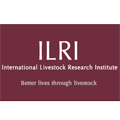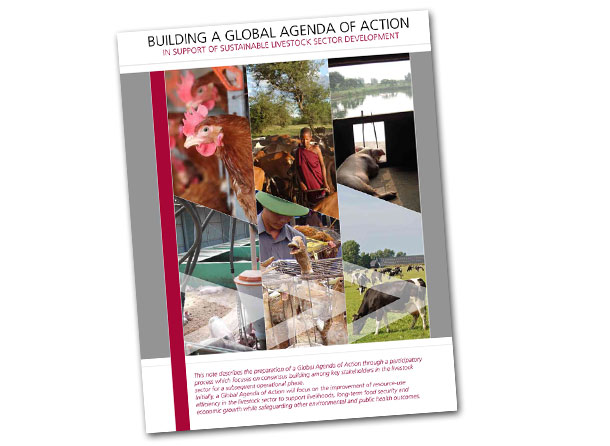 A Global Agenda of Action in Support of Sustainable Livestock Sector Development is being built. It focuses on the improvement of resource-use efficiency in the livestock sector to support livelihoods, long-term food security and economic growth while safeguarding other environmental and public health outcomes.
A Global Agenda of Action in Support of Sustainable Livestock Sector Development is being built. It focuses on the improvement of resource-use efficiency in the livestock sector to support livelihoods, long-term food security and economic growth while safeguarding other environmental and public health outcomes.
Growing populations, income gains and urbanization have made livestock one of the fastest growing sub-sectors of agriculture. Growth in emerging economies has been particularly impressive and has been associated with a widespread transformation of the livestock sector. However, livestock sector growth has been largely unbalanced and often not been accompanied by concomitant adjustments and improvements in sector policies, governance and investments. Continuing demand expansion for livestock products and increasing resource constraints will likely exacerbate these trends.

A proposal by the current chair Jimmy Smith, director general of the International Livestock Research Institute (ILRI), to co-chair an Interim Preparatory Committee of the Global Agenda of Action with Francois Le Gall, livestock adviser at the World Bank, was endorsed by a second meeting of the Agenda’s Multi-stakeholder Platform, in Phuket, Thailand, 1–4 Dec 2011.
This note describes the preparation of a Global Agenda of Action through a participatory process which focuses on consensus building among key stakeholders in the livestock sector for a subsequent operational phase.
Excerpts
‘A global agenda of action is being built around the notion that demand growth for livestock products will likely continue for decades to come, as incomes and human populations continue to grow. Such growth will need to be accommodated within the context of a finite and sometimes dwindling natural resource base, and will be faced with the need to respond to climate change, both adapting and mitigating.
‘Demand growth also presents opportunities for social and economic development that many developing countries would not want to miss. In addition, the livestock sector provides numerous opportunities for enhanced food security and livelihood support.
‘To ensure that such multiple promises for the livestock sector to contribute to society’s environmental, social, economic and health objectives materialize, concerted sector stakeholder action needs to be mobilized towards the necessary changes in regulatory frameworks, policies, technologies, and supporting investments.
‘The development of a Global Agenda of Action heeds the call of these opportunities.
Building a global agenda of action
‘A Global Agenda of Action in support of sustainable livestock sector development is consensual and built on broad based, voluntary and informal stakeholder commitment to act towards the improvement of resource-use efficiency in the global livestock sector to support livelihoods, long-term food security and economic growth while safeguarding other environmental and public health outcomes. member countries, private sector, civil society, academia, research, and international organization stakeholders have all been closely involved in broad stakeholder consultations to create awareness and to discuss and agree on the objectives, priorities, and conceptual framework of a global agenda of action.
‘The initiative is linked closely to FAO’s inter-governmental processes of its committee on agriculture (COAG), which during its 22nd session held in 2010 recommended that FAO actively engage in a global dialogue with a wide range of stakeholders to sharpen the definition of the livestock sector’s objectives.
‘Two multi-stakeholder platform (MSP) meetings have thus far been held as part of the development of a global agenda of action; the first in Brasilia, Brazil (17–20 May 2011), and the second in Phuket, Thailand (1–4 December 2011).
Where are we now?
‘The MSP endorsed natural resource use efficiency in the livestock sector, covering entire commodity chains, as the thematic centre of the agenda, initially focussing on three areas, namely “closing the efficiency gap”, “restoring value to grassland”, and “towards zero discharge”. The basic concept, or the main theory of change, underlying the Global Agenda of Action in each of these focus areas, is that resource use efficiency and thus sustainable development of the livestock sector can be achieved by an increase in the use of human-made resources and a concomitant reduction in the use of natural resources per unit of desired output. Whilst the relative emphasis and the approaches for each focus area will vary from region to region, each of the three focus areas presents specific ‘game changing’ opportunities to make large environmental, social and economic gains...’

February 14, 2012 - International Livestock Research Institute (ILRI)


